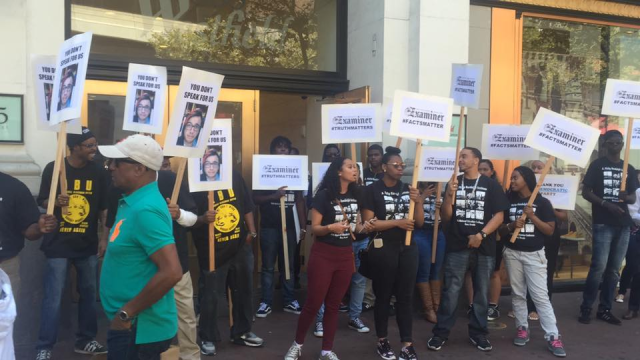Was the point to complain about the politics of a story — or about a reporter calling out a politician?

By Tim Redmond
JULY 29, 2015 — You don’t see picket lines outside newspapers much these days. People used to protest at the Chron every now and then, when the paper ran an awful story about something, but I think the world of activists has come to understand that the Chron doesn’t dominate the local news the way it once did. And it’s really easy to blast a bad newspaper story with social media.
But today a group of protesters showed up in front of the office of the SF Examiner to attack reporter Joe Fitzgerald Rodriguez because of a column he wrote saying pretty much the same thing I did about the SF Democratic Party.
I missed the demonstration. I guess I wasn’t on the email list. Not surprising. Julia Carrie Wong did a good job outlining what went on, and you can read her piece here.
The issue, apparently, was that the Public Defender’s Office Racial Justice Committee recommended, gently, that
The Police Department shall make every effort to assign patrol duty in minority communities to minority officers. The RJC recognizes the limitations of this goal, including union agreements, seniority, and individual officer preferences.
That’s something that I have heard communities of color ask for repeatedly over the years. The RJC didn’t just make up the idea; it’s been around a long time.
But the protesters now call it “segregated policing.” Okay, if that’s how they see it.
Rebecca Young from the Public Defender’s Office says says that
[T]he RJC welcomes a dialogue with the APRI, but that the protesters’ criticism of the policy as promoting “segregation” echoes the response of the San Francisco Police Officers Association (POA).
Here’s the other interesting point: The protesters seem to be saying that Fitzgerald Rodriguez wasn’t accurate in his story because he didn’t talk about the issue they had with police “segregation.” But I have been following this story for months – and that issue, and that term, never once came up at the DCCC.
The two people who worked on the resolution in question, Hene Kelly and Kelly Dwyer, spent months on it. They talked to the cops. They talk to the public defender’s Racial Justice Committee. The measure came up before at the DCCC and was delayed to get more input.
There was plenty of time to raise any of these concerns. Nobody did.
No: The really key element here is that Rodriguez called out Joshua Arce, who is a member of the DCCC and who gutted a police-reform resolution that was drafted in response to the Black Lives Matter protests.
Arce works for the Laborer’s Union, and is close to the two groups that were visibly present at the (modest) demonstration.
Here is what one of the demonstrators posted on Facebook:
The Community has spoken! This morning’s article in The San Francisco Examiner prompted an explosive backlash outside of the newspaper’s headquarters. Unlike the Examiner, our community is NOT in support of segregated policing and will not stand for attacks on our allies in the San Francisco Democratic Party, especially after they pass resolutions supporting #blacklivesmatter and 21st Century Policing. Thanks to my brothers and sisters at ABU, LiUNA!, Local 261 and especially to you my brother,Joshua Arce for your leadership and partnership!
Okay, except: The Black Lives Matter resolution is the one Arce gutted. The protest, apparently, was made up of Arce’s allies.
I called Arce. I texted him. I emailed him. He won’t respond to my simple question: What role did he have in organizing the protest?
Do you suppose this was all about trying to discredit a journalist who dared to go after the increasingly conservative leadership of the Democratic Party and who called out a politician with whom he disagreed – which is what political columnists do?
Or am I missing something here?






